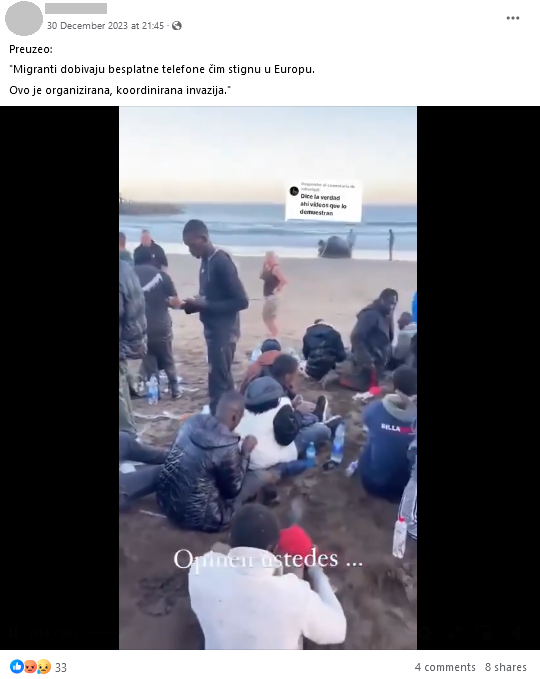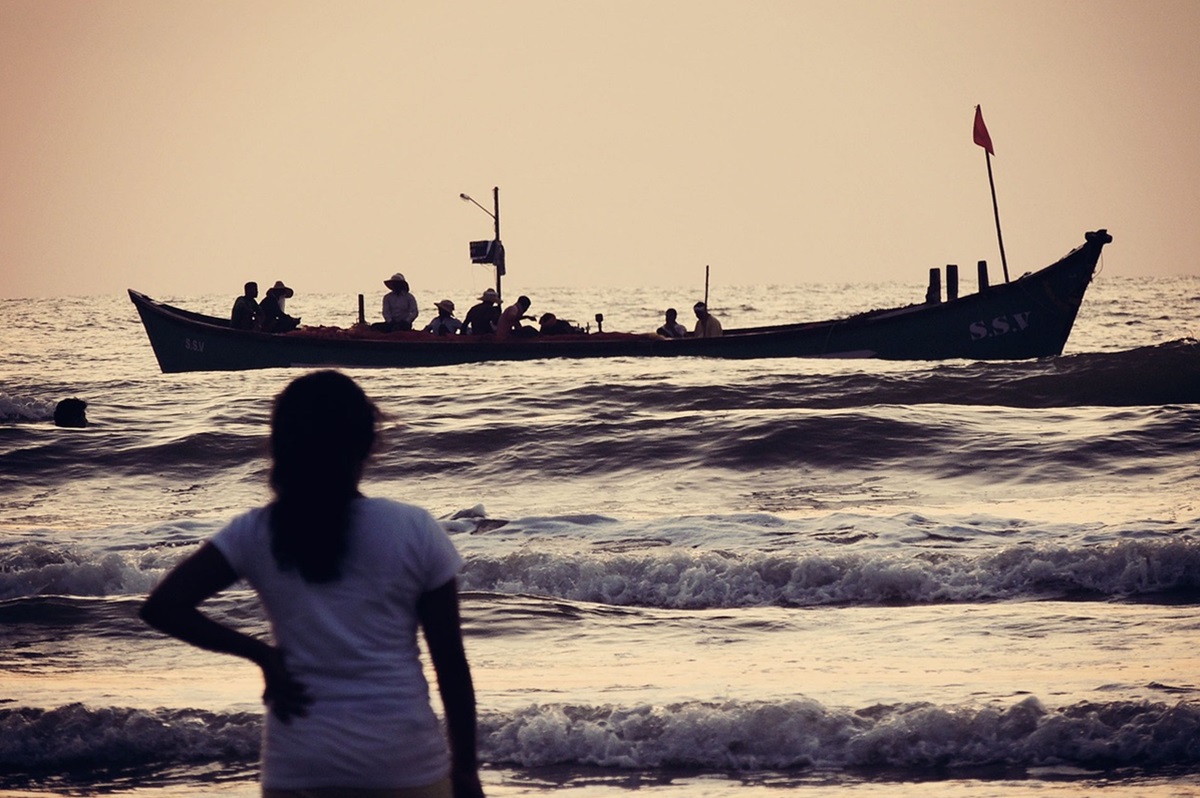Original article (in Croatian) was published on 8/1/2024; Author: Anja Vladisavljević
A misleading video circulating online suggests that migrants receive free mobile phones upon arriving in Europe.
The video, is shared with the following description:
“Migrants get free phones as soon as they arrive in Europe. This is an organized, coordinated invasion”, states a Facebook status posted on December 30, 2023 (the post is archived here).

The post includes a short video (also archived here) depicting a group of individuals on a beach, clad in winter attire, consuming food, drinking water, and unwrapping cell phones from a plastic material akin to kitchen wrap. The author of the post, apart from admitting that the content was taken from another source, does not specify which source it is, as well as the exact time and location where the video was made. Furthermore, there is no indication of who might be distributing the mobile devices, and the video itself does not show the individuals receiving them from anyone.
The video does not document mobile phones being given away
This video was shared in various languages and on different platforms (TikTok, YouTube, BitChute, X, Facebook), often with the claim that it was shot in Spain, or more specifically, in the Canary Islands, a Spanish archipelago off the coast of northwest Africa. The Spanish fact-checking website Maldita reported that on social media, it was alleged that the footage depicted migrants in the Canary Islands receiving “high-end mobile devices” from the Spanish government.
Maldita identified the original video, uploaded on December 27, 2023, by the TikTok user salseosdelatv. Contrary to the circulating claims, the video did not state that the Spanish government provided the migrants with mobile phones. Instead, it indicated that the migrants arrived with their own phones. Additionally, the Spanish Ministry of Inclusion, Social Security, and Migration had previously clarified to Maldita (in response to similar claims that circulated in October of the previous year) that providing free mobile phones is not a part of their humanitarian assistance for migrants.
The video in question was recorded on December 27, 2023, at La Garita Beach in the town of Arrieta, situated on Lanzarote, one of the Canary Islands. On that same day, local media sources reported the arrival of a group of 54 migrants from the sub-Saharan region at La Garita Beach (1, 2). This group included seven women and a girl. They arrived in an inflatable boat, which is also visible in the social media video. Photos from local media further validate that the event shown in the video matches the actual event, as several individuals appear in both the video and the media photos (1, 2, 3).
“The boat surprised tourists and locals who were on the beach and who came to help in the rescue”, reported La Provincia, local news outlet. This media outlet, as well as others that reported on the mentioned event, in their reports did not mention that over 50 rescued migrants received free mobile phones. While some photos show migrants holding mobile phones, there is no evidence that they were provided with these phones upon arrival.
A dangerous route to Europe
Additionally, the claim that this incident represents an “organized and coordinated invasion” lacks credible foundation. This term is often used by anti-immigrant groups to delegitimize refugees, asylum seekers, and migrants. The term invasion means “invasion of the armed forces of one or more states, coalitions or alliances into the territory of another, belligerent or neutral state.” In this context, the arrival of fifty individuals by rubber boat to Spanish territory does not constitute an “invasion” in the traditional military sense.
According to the Info Migrants web portal, which cites data from the Spanish Ministry of the Interior, Spain was the second most common destination for Mediterranean migration flows in 2023, with 53,000 arrivals, trailing only Italy. In the same year, it is estimated that at least 1,142 people died or disappeared at sea while trying to reach the Spanish coast.
The route to the Canary Islands across the Atlantic Ocean is among the most treacherous paths to Europe. Most of the migrants and refugees who arrive in Spain via this route come from Senegal, driven by socio-political turmoil, unemployment, or inadequate healthcare. The International Organization for Migration (IOM) reported that nearly 15,000 migrants arrived irregularly in the Canary Islands between January and September 2023, after crossing by boat from West Africa’s coast. This figure marks a 19 percent increase from 2022.
“However, risks and dangers along the West African Atlantic route still exist and in 2023, 26 shipwrecks were recorded along the route, resulting in the death or disappearance of 424 migrants”, IOM reported last December.
The Mediterranean Sea route to Europe is similarly perilous. Emergency, a Milan-based NGO, reported at the start of the year that the Mediterranean continues to be a “graveyard of migrants,” with over 28,000 deaths recorded in the past decade. This tragic toll includes women, children, and entire migrant families. The organization also highlighted that in 2023, its ship rescued more than 1,200 people, despite “European ‘containment policies’, externalization of borders and ‘cooperation agreements’ with countries that do not ensure safety for those fleeing”.
The Spanish maritime rescue service, active around the Canary Islands, along with other maritime guards in the Mediterranean (1, 2), has faced criticism for their perceived lack of urgency and willingness in rescuing migrants at sea. Additionally, the role of the European Border and Coast Guard Agency (Frontex), which supports EU countries in managing external borders and standardizing border controls, is under scrutiny for its potential contribution to migrant suffering (1, 2).
It’s important to recognize that international and EU laws mandate the provision of assistance to anyone in distress at sea. This legal obligation for EU member states is established by several international conventions, including the International Convention for the Safety of Life at Sea (1974), the United Nations Convention on the Law of the Sea (1982), and the International Convention on Maritime Search and Rescue (1979), as well as EU law. These laws underscore the duty to aid those facing perilous situations on the sea.
Confiscation and destruction of mobile phones
Migrants often rely on mobile phones not as a luxury, but as ab absolute necessity for accessing essential information, knowing their location, and staying in touch with family. While an internet search does not yield any results on the right of newly arrived migrants to a free mobile phone, there are reports of the practice of confiscating or destroying mobile phones owned by migrants.
A report by the Spanish newspaper El Pais last year highlighted actions by Greek border authorities, who allegedly seized at least 2.2 million euros worth of cash and property from migrants and refugees during push-backs at the Turkish border over a six-year period. The confiscated items included valuable personal belongings such as mobile phones and jewelry. Eva Cosse, a researcher from Human Rights Watch, told El Pais that the primary purpose of confiscating mobile phones and money from migrants was to deter them from attempting future border crossings.
Additionally, various reports from media sources and NGOs have surfaced regarding the destruction and confiscation of mobile phones from migrants and refugees along the so-called Balkan route (1, 2, 3, 4, 5). These reports suggest that Croatian police are denying migrants the right to seek asylum, forcibly expelling them from Croatian territory, and destroying their mobile phones.
In the United Kingdom, there was an instance where the Home Office engaged in a policy deemed both illegal and non-transparent, involving the confiscation of nearly 2,000 mobile devices from asylum seekers who arrived by small boats. In 2022, the UK High Court ruled this practice illegal on multiple grounds, determining that it infringed upon the human rights of the asylum seekers.
Considering all of the above, including criticism of the inadequate protection system at sea and reports of human rights violations at European borders, the claim that “migrants get free phones as soon as they arrive in Europe” is unfounded.



